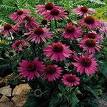Echinacea
Echinacea augustifolia, E. purpurea, E. pa/lida Asteraceae/Compositae Also called Coneflower. A plant if the North American plains, echinacea was used by native Americans to treat wounds and snakebites. TOday, three species if the perennial herb are cultivated for medicinal purposes. Echinacea has a long }lowering season and is a pretty and popular garden plant. Parts used
ConstituentsThe root contains a volatile oil, polysaccharides, resins - whose antiseptic and antifungal actions stimulate the immune system - and antibacterial and antiviral glucosides. Medicinal usesEchinacea is an effective remedy for influenza, colds, upper respiratory tract infections, genitourinary infections and other diseases. It is widely used to combat the common cold: it restores the body to health quickly while helping the immune system to fight off other infections. In 2002, Canadian scientists showed that, in vitro, echinacea was an effective antiviral agent against herpes simplex. In 1988, German researchers discovered that the herb produced a noticeable increase in phagocytosis, a process by which foreign bodies are engulfed by the body's immune cells. Echinacea strengthens the body's immune system and increases resistance to infection, particularly to influenza. This makes the herb especially useful for those with weakened immune systems. It may, therefore, be valuable as a supplementary treatment when the immune system is suppressed by drugs, for example, as a result of anticancer chemotherapy. However, this should only be considered in consultation with a doctor. PREPARATION AND DOSAGEFor internal use TO TREAT colds, sore throat, influenza, bronchitis CAPSULES (32Smg) Take 1-3 capsules a day with a glass of water before meals. IF SYMPTOMS PERSIST CONSULT A DOCTOR CultivationPlant in a sunny spot in rich, well-drained soil. CAUTIONS
|
Ayurveda Book
This book on Ayurveda is meant for people interested to know about basics concepts of Ayurvedic healing and learn ayurveda concepts. Though there are many books Read More My SitesReal Testimonials
Connect with us |







